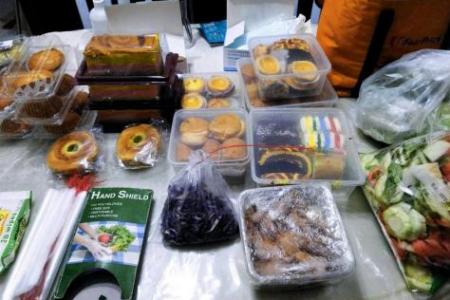Proposed Good Samaritan law could boost donations of unsold food
Whenever she collects unsold food items from restaurants, she ensures that they are safe to share with the migrant workers and needy families in her neighbourhood.
Said the food rescuer who wanted to be known only as Ms Cassie: "I tell them to eat the cooked food immediately while it's hot. If anything happens, I would feel terrible."
Eateries are in a constant war against food-loving bacteria that can cause food poisoning and severe health issues.
This is why food rescuers, businesses and food charities take painstaking measures to ensure that surplus food that is donated is safe and hygienic - both to protect the recipients' health, as well as their own reputations.
But a proposed law could protect businesses donating the food from being sued or prosecuted if a recipient gets food poisoning, for instance, as long as the food complies with strict safety and hygiene laws at the point of donation.
The proposed Good Samaritan Food Donation Bill is the brainchild of Nee Soon GRC MP Louis Ng, who hopes to introduce it through a Private Member's Bill next year.
The proposed law aims to cut Singapore's food waste problem - a major waste stream here, which has grown by about 20 per cent over the past decade.
Food waste comprised about 11 per cent of the total waste generated last year. Only 19 per cent of the 665,000 tonnes of food waste was recycled.
It is not yet clear if ground-up food rescue and zero-waste groups like Divert For 2nd Life, which Ms Cassie volunteers with, will be covered under the proposed Bill.
The Singaporean who is in her 50s said her hardscrabble childhood in a large family made minimising waste and dumpster-diving jaunts with her mother a way of life.
She now picks up unsold meals, vegetables and fruits, and baked goods from eateries and hotels at least five times a week.
Currently unemployed, she has been active with Divert For 2nd Life for a few months.
Before sharing the food with her Malaysian flatmates and migrant workers, she makes sure to reheat the frozen or chilled food in a pressure cooker to almost 100 deg C.
She once stayed up till 2am to cook up a batch of fried rice using unsold rice and cooked vegetables collected from a Chinese restaurant in Joo Chiat.
The base of the rice pack had become soggy. But not one to waste food, she salvaged the good portions and cooked it with the vegetables, adding spices and herbs.
Between July and September this year, an online public consultation conducted by the Good Samaritan Legislation Review Committee, which is helmed by Mr Ng, found strong support for the liability waiver.
About 75 per cent of more than 330 respondents were also in favour of similar protections for logistics providers for food donation charities.
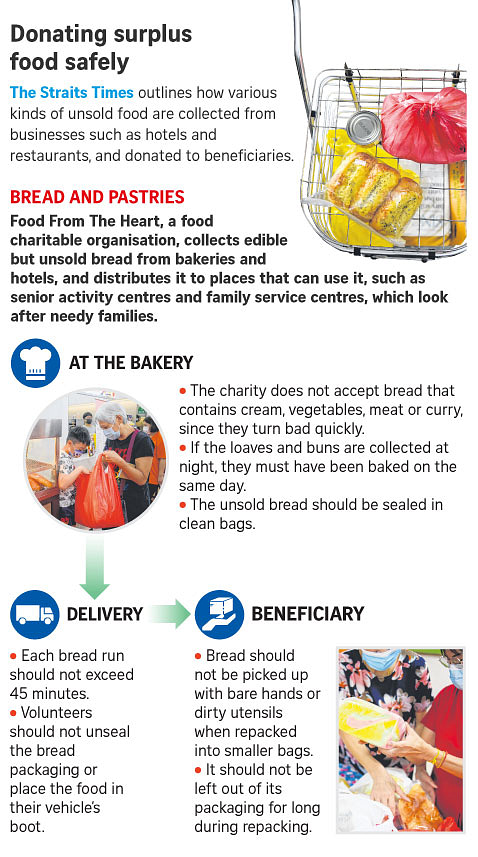
Hotels and food charities welcome the proposed law, saying it will reassure and encourage more food outlets to donate surplus food instead of binning it at the end of each day.
Among those practising this is Millennium Hotels and Resorts, whose six hotels donate more than 800 bento boxes of surplus food each month to a community organisation that rescues and diverts excess food.
A spokesman for the hotel group, however, highlighted legal hoops in the food donation process. This includes drawing up indemnity agreements to cover any potential issues that might arise from the donations.
At Marina Bay Sands, well-oiled procedures in the kitchens ensure that unserved cooked food is certified safe before being handed over to The Food Bank Singapore (FBSG).
Among other protocols, the cooked food must be blast-chilled and each ingredient scrutinised.
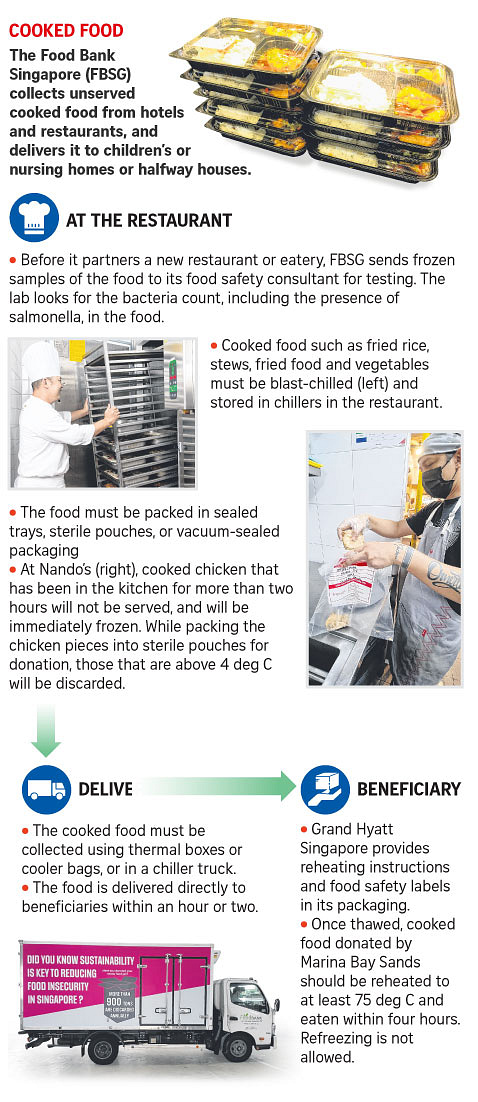
The fear of liability is the key obstacle that prevents many food businesses from donating their unsold food, noted FBSG co-founder Nicholas Ng, who is also a member of the review committee.
"The fear of liability and accountability is real. In our conversations with F&B establishments over the past several years, many raise this issue as no protocol or processes are in place to manage food donations," he said.
Restaurant chain Nando's donates about 20 unsold whole chickens and 70 chicken parts to FBSG every week. The chain had previously done a lab test to check for bacteria on chicken pieces that were reheated after they had been stored in a freezer for a week, to confirm that the food was safe.
Under the proposed law, the review committee is looking into introducing stringent codes for food donation.
According to Singapore's food waste management hierarchy published in the National Environment Agency's website, redistributing excess food is prioritised over recycling and treating food waste. But the most ideal solution is to avoid wasting food at the onset by optimising the use of ingredients.
Since 2015, Grand Hyatt Singapore has donated more than 10 tonnes of excess food from its restaurants and kitchens to about 400 families, said Mr Steffan Heerdt, the hotel's executive sous chef.
He added: "Hotels and restaurants would probably have challenges with timely and well-organised logistics to ensure that the unsold food is repacked and handed off to a food charity partner in time, to be safe for consumption when it reaches beneficiaries."
Charities - not a dumping ground
While food charities are optimistic that more unsold food will be donated instead of thrown away if the Bill is passed, they are wary about being at the receiving end of excessive, low-quality food.
"We are looking for quality food donations, good donations that beneficiaries can benefit from," said Food from the Heart chief executive Sim Bee Hia, who is also a member of the review committee.
Agreeing, Mr Ng added: "The Singapore Food Agency needs to be involved to provide guidelines on what food items can be donated and safely consumed. It's... to ensure that people do not take advantage of this bill to treat charities as dumpsters."
In the online consultation, 63 per cent of respondents agreed that businesses that donate food to food charities should be allowed to claim associated business expenses as deductions against their revenue.
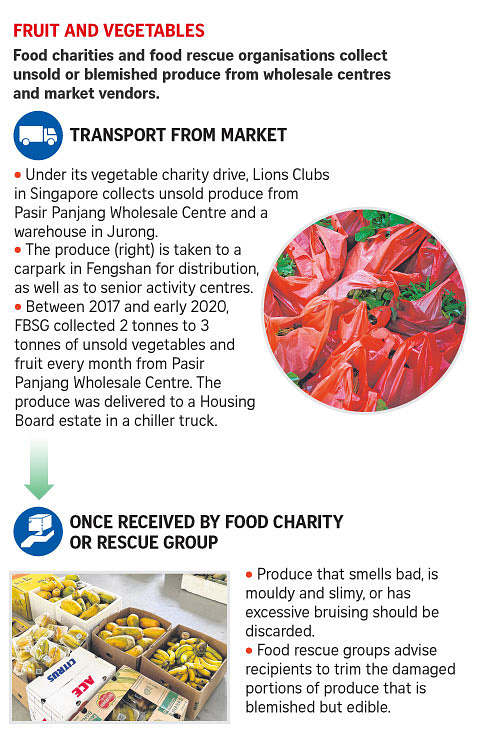
Eight in 10 also said tax exemptions should be provided for food businesses and food charities to buy specialised equipment such as blast chillers.
Ms Sim cautioned: "The liability waiver or tax incentives should not tilt the balance so much that we become such an easy alternative and become a dumping ground."
Ms Charmaine Yap, secretary of the review committee, said food rescue groups may be considered as food charitable organisations for the purposes of the Bill, but those that save expired food, for instance, may not be eligible.
"We would also emphasise that even if food rescue groups don't qualify as food charitable organisations, the Bill will not change how they currently carry out their work," Ms Yap added.
Food charities may also need to be accredited under the proposed Bill to ensure that there are safeguards in place for food safety and hygiene, even if they have Institution of a Public Character (IPC) status.
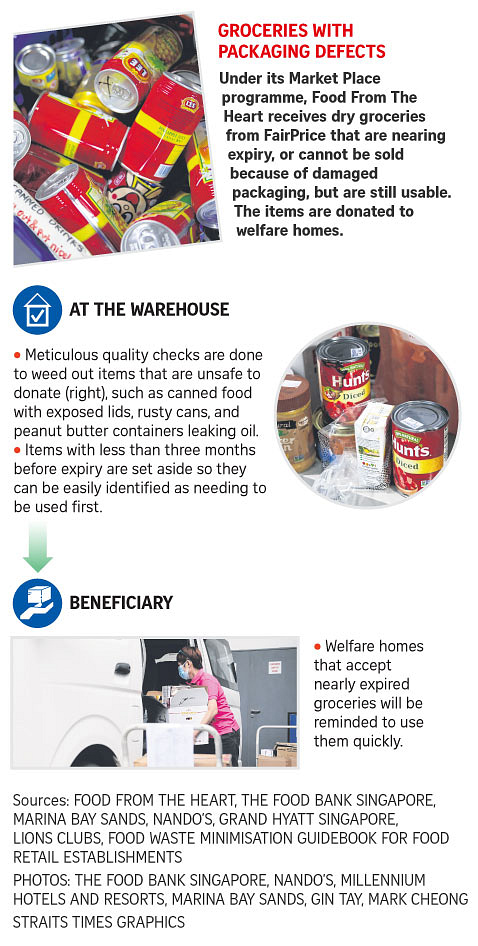
"As to the precise requirements and content of any accreditation, this is something that we are consulting with the stakeholders, ministries, and agencies on," said Ms Yap.
The review committee will meet with food charities and groups next month to discuss a proposed accreditation scheme.
Food from the Heart is supportive of an accreditation.
Ms Sim said: "When you talk about accreditation beyond IPC, it's more about the food charity's track record, the number of beneficiaries it serves, and sustainable giving.
"The accreditation would help donors, or food businesses, differentiate who they want to work with. That would ultimately help to streamline food support in Singapore, and be more efficient."
Get The New Paper on your phone with the free TNP app. Download from the Apple App Store or Google Play Store now

